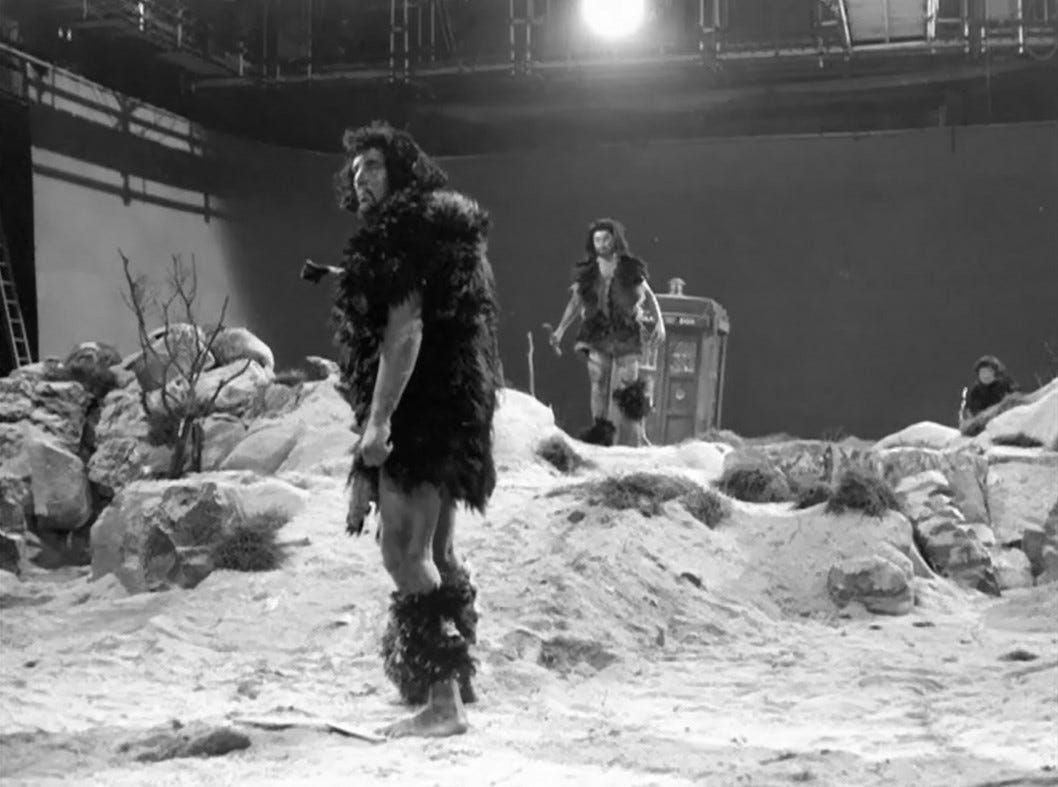An Unearthly Child and the tribes of Skaro
Although it was the production team’s intention that the second, third and fourth episodes of An Unearthly Child were set in Earth’s stone age, it’s long been recognised by fans that there’s no definite on-screen identification of the time or place of the TARDIS’s landing.
The Doctor states in part two that they have travelled into the past but in the context of the unplanned take-off and the Doctor’s inability to control the ship, he could easily be mistaken. His comment also does not exclude a movement in space, as well as in time. Indeed, he says to Ian upon viewing the scanner screen: “Well, there you are, a new world for you.” He’s probably talking figurately but equally maybe he’s not wholly sure whether they have left Earth behind or not.
This opens up the possibility for the adventure with the cave people to occur on another world altogether or in a different time period from what it first appears. Jack Graham argued cogently in Panic Moon that the tribe could be a depiction of a post-nuclear holocaust humanity, connecting the story to the nuclear fears of the time, as more obviously expressed in the next story, The Daleks. I have another theory, though it too has a connection with The Daleks and nuclear warfare.
It has sometimes been suggested that the TARDIS’s journey may have been in time, not space, meaning that the Doctor’s party emerge into prehistoric London. This is unlikely given the early stage of human development depicted in An Unearthly Child, which is suggestive of an African setting. Nevertheless, I like the idea of the move in only one dimension. Let’s reverse it. What if the TARDIS doesn’t move in time, only in space? And what if its next journey is the one that moves only in time, not space?
I’m suggesting that the first, random journey may in fact have taken the travellers to Skaro at a point early in its inhabitants’ development. The cave people are the ancestors of the Kaleds or the Thals (or possibly both – they’re not different species, after all, only different races). Let’s say they’re the Kaleds for now. There’s a reference to other tribes living “on the other side of the mountains”. Perhaps that’s the Thals. Might those mountains not be the same ones which we later see behind the Dalek city? The animal skull Susan finds early on in the adventure is long and pointed, not unlike the head of the Magnedon seen in The Daleks, perhaps suggesting an evolutionary link.
And what of Ian’s gift of the secret of fire? With this source of heat, he ensures the small tribe of proto-Kaleds survive and prosper. In proving the worth of fire as a tool and the importance of strict methodology in its creation, it may also have helped direct them towards technological development. This is how they end up with a high-tech human-like civilisation, ultimately capable of the nuclear warfare which ravages the planet and leads to the development of the Daleks. In giving them fire, did Ian ultimately and unwittingly give life to the Daleks?
In An Unearthly Child we see a dangerously insular tribe, some of whom advocate killing the TARDIS travellers for their difference, and some view Kal, who came from a different tribe, with suspicion (rightly as it transpires). Once they had the benefit of fire to ensure their own survival, and a new skill (or weapon) to jealously guard, did these xenophobic instincts re-emerge with even greater force, setting them on a path of belligerence against any outsider? Is this the origin of the blind racial hatred that led to the Kaled/Thal conflict?
In this scenario, Kal is a Thal, with the distinctive blond hair of the race perhaps being a later evolutionary development. Or is the tribe the proto-Thals – with Kal named after his own original tribe, or it later named after him, perhaps by the Thals themselves? Does ‘Kal’ derive from Kaled or could Kaled mean ‘Kal’s tribe’ or similar?
When the TARDIS is rapidly set into motion at the end of An Unearthly Child, it doesn’t shift in space at all, but slips forwards in time many thousands of years, to the Skaro of their distant future. Although they don’t know it, the time travellers now witness the aftermath of the arms race started in the contest to make fire and must contend with the Daleks, its ultimate product.
Okay, it’s a bit contrived as theories go (and the cave people could just as easily be the inhabitants of ancient Mondas, also learning their first ‘technological’ method of surviving harsh conditions), but an intriguing one. Bear it in mind when you next watch the story and see if it shows it in a new light.
Images © BBC
Sources
Panic Moon December 2013 issue






